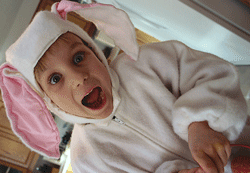In American culture, Halloween is an intriguing mix of ghastly imagery and holiday fun, and at the forefront of all the excitement are children. But how much is too much when it comes to Halloween fun?
From trick-or-treating to donning the garb of their favorite cartoon character, there’s no doubt children enjoy Halloween. But for many kids, the array of ghosts, ghouls and other creatures of the night can be a bit too scary.
In the following St. Louis Post-Dispatch article, Dennis O’Brien, research associate in psychiatry, provides insight into the mindset of children in relation to Halloween.
Family Matters: Halloween shouldn’t be harrowing for children
(Republished with permission from the St. Louis Post-Dispatch. This article originally ran in the Neighborhoods section on Monday, October 19, 2004)
By Dennis O’Brien
Most kids to some degree relish being scared in their fantasies because they enjoy being safe in real life.
But for young children there is always a point where a little more is far too much, and it is important to respect their limits.

For example, although her brother had a leading role in a graduation-week production of “Little Shop of Horrors,” our daughter, then 7, and I left and spent the time walking around the school campus. Just a glimpse of the people-eating plant in the first act was enough for her to realize she wanted no part of this play, whatever her brother’s role.
Halloween celebrates the fear of death, with ghouls rising from their graves to haunt the evening. Some children revel in it, but others — especially the young — are terrified unnecessarily. Children instinctively fear death, abandonment and violence — the basic elements of Halloween and many forms of entertainment in our culture.
These fears have been intensified for children by the Sept. 11, 2001, terrorist attacks, the unfinished war against terror, the carnage in Iraq that seems to be a fixture in the news, and the heightened anxiety of adults.
But parents can decide what is appropriate for their own children in order to make Halloween more like a visit to Dorothy’s Oz than a plunge into a shop of horrors.
Fears of monsters and death linger on in secret longer than parents might think. This is perfectly OK, unless these fears actively interfere with a child’s life. Always respect your children’s fears, realizing they are real to them even if not to adults.
Allow your child to choose a comfortable level of participation. Who hasn’t seen thoughtless parents push a resistant child to sit on Santa’s lap, pat the Easter bunny or approach a circus clown to overcome shyness? Parents should not push children to act threatening, to expose themselves to frightening situations or to confront fears adults consider “unrealistic.”
Emphasize the fantasy aspects of Halloween, not the scary ones. Help your child enjoy Halloween by pretending to be more beautiful, powerful, wiser or talented, as a princess, a dancer, a doctor or an astronaut. Kids love dress-up and make-believe games, and these are healthy outlets for their creativity, imaginations and ability to “practice” adult situations.
As you guide your youngster along the trick-or-treat route or school parade, you can give reassurance and help process scary creatures by talking about them after each encounter. If you recognize the monsters, use their names to humanize them further.
Make Halloween a social occasion by organizing a group of your child’s friends to trick or treat together, ending with cocoa or cider at your home. Partner up with other parents, and personally accompany your child. Go early, visit familiar neighborhoods and avoid large, rowdy groups of tricksters, especially if they look older.
Do not force your child to hand out treats in your home if just watching seems to be all he can handle.
Halloween-type terrors surface in many movies and television programs, and these need to be monitored carefully by parents as well.
A parent could do much worse than simply declare such movies off-limits until the child is emotionally ready to handle the issues involved. Why promote this type of terror-based entertainment, anyway?
Remember that teens are children, too. Ask yourself if it is appropriate for them to be exposed to movies like “Friday the 13th” that meld violence, terror and ghoulish humor into moneymaking entertainment?
Sure, your teen can “handle” it, but should he? Is it healthy?
By respecting the power of fear, using common sense and acting on your values, you can make occasions like Halloween healthy and emotionally safe for your child.
Dennis O’Brien is a licensed clinical social worker, experienced educator and therapist who writes educational materials for the Washington University School of Medicine, Department of Psychiatry.
Copyright 2004 St. Louis Post-Dispatch, Inc.